
Matthew 3:11 is the eleventh verse of the third chapter of the Gospel of Matthew in the New Testament. The verse occurs in the section relating the preachings of John the Baptist. In this verse he predicts that he will be followed by someone much greater than himself. The main theme of this verse is that John will soon be supplanted by a much greater figure and that John's water baptism is just a preparation for the much greater baptism with the Holy Spirit and fire.

Matthew 4:1 is the first verse of the fourth chapter of the Gospel of Matthew in the New Testament. This verse opens the section in Matthew dealing with the temptation of Christ by Satan. Jesus has just been baptized by John the Baptist; in this verse he is led out into the wilderness.

Matthew 4:3 is the third verse of the fourth chapter of the Gospel of Matthew in the New Testament. This verse opens the section in Matthew dealing with the temptation of Christ by Satan. Jesus has been fasting for forty days and forty nights, and in this verse the devil gives Christ his first temptation by encouraging him to use his powers to get food.
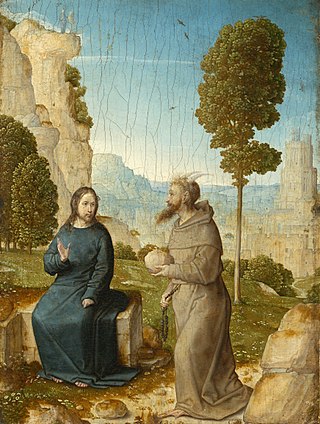
Matthew 4:4 is the fourth verse of the fourth chapter of the Gospel of Matthew in the New Testament. Jesus, who has been fasting in the desert, has just been tempted by Satan to make bread from stones to relieve his hunger, and in this verse he rejects this idea.
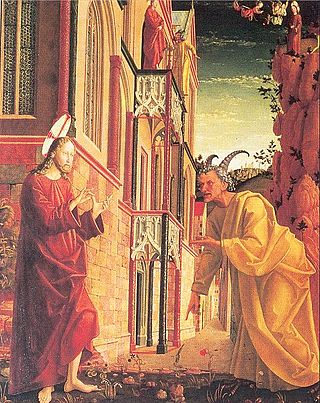
Matthew 4:5 is the fifth verse of the fourth chapter of the Gospel of Matthew in the New Testament. Jesus has just rebuffed Satan's first temptation, and in this verse the devil transports him to the site of the second temptation.

Matthew 4:6 is the sixth verse of the fourth chapter of the Gospel of Matthew in the New Testament. Jesus has just rebuffed "the tempter's" first temptation; in this verse, the devil presents Jesus with a second temptation while they are standing on the pinnacle of the temple in the "holy city" (Jerusalem).
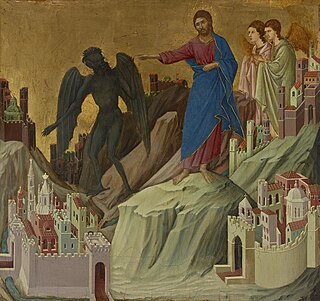
Matthew 4:8 is the eighth verse of the fourth chapter of the Gospel of Matthew in the New Testament. Jesus has just rejected Satan's second temptation. In this verse the devil transports Jesus to a new location for the third temptation.

Matthew 6:13 is the thirteenth verse of the sixth chapter of the Gospel of Matthew in the New Testament, and forms part of the Sermon on the Mount. This verse is the fifth and final one of the Lord's Prayer, one of the best known parts of the entire New Testament.
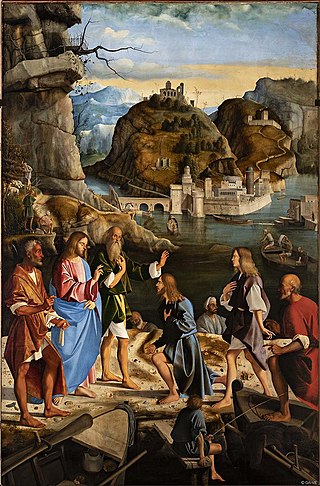
Matthew 4:21 is the twenty-first verse of the fourth chapter of the Gospel of Matthew in the New Testament. Jesus has just recruited Simon Peter and Andrew as disciples. In this verse he encounters the brothers James and John.

Matthew 5:26 is the twenty-sixth verse of the fifth chapter of the Gospel of Matthew in the New Testament and is part of the Sermon on the Mount. Jesus has just warned that if you do not reconcile with your enemies a judge is likely to throw you in jail. In this verse Jesus mentions that your debts must be paid completely before one can leave.

Matthew 5:48 is the forty-eighth and final verse of the fifth chapter of the Gospel of Matthew in the New Testament and is part of the Sermon on the Mount. This is the final verse of the final antithesis, and it is a summary of Jesus' earlier teachings.
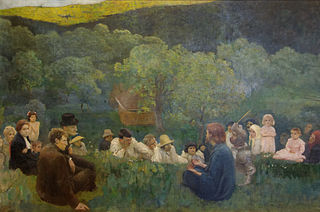
Matthew 6:25 is the twenty-fifth verse of the sixth chapter of the Gospel of Matthew in the New Testament and is part of the Sermon on the Mount. This verse shifts the discussion from one of money to one of worry.

Matthew 6:26 is the twenty-sixth verse of the sixth chapter of the Gospel of Matthew in the New Testament and is part of the Sermon on the Mount. This verse continues the discussion of worry about material provisions. In this verse Jesus tells his followers not to be anxious about food, but to rely on God as the birds, who are worth far less than people, are fully provided for.

Matthew 6:27 is the twenty-seventh verse of the sixth chapter of the Gospel of Matthew in the New Testament and is part of the Sermon on the Mount. This verse continues the discussion of worry about material provisions.

Matthew 6:31 and Matthew 6:32 are the thirty-first and thirty-second verses of the sixth chapter of the Gospel of Matthew in the New Testament and is part of the Sermon on the Mount. This verse continues the discussion of worry about material provisions.

Matthew 6:34 is “Therefore do not worry about tomorrow, for tomorrow will worry about itself. Each day has enough trouble of its own.” It is the thirty-fourth, and final, verse of the sixth chapter of the Gospel of Matthew in the New Testament and is part of the Sermon on the Mount. This verse concludes the discussion of worry about material provisions.

Matthew 7:7–8 are the seventh and eighth verses of the seventh chapter of the Gospel of Matthew in the New Testament and is part of the Sermon on the Mount. These verses begin an important metaphor generally believed to be about prayer.
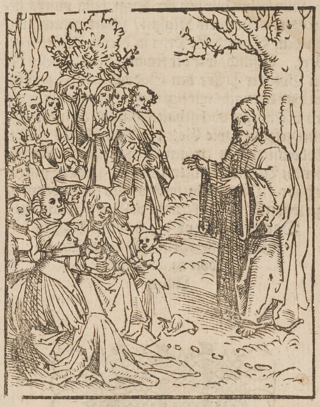
Matthew 7:10 is the tenth verse of the seventh chapter of the Gospel of Matthew in the New Testament and is part of the Sermon on the Mount. This verse presents the second of a pair of metaphors explaining the benefits of prayer.

Matthew 7:11 is the eleventh verse of the seventh chapter of the Gospel of Matthew in the New Testament and is part of the Sermon on the Mount. This verse summarizes the preceding metaphors in favour of prayer.
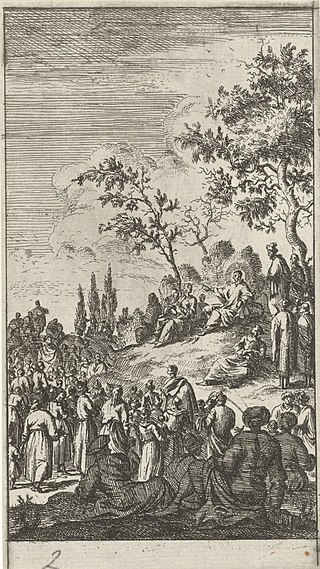
Matthew 7:16 is the sixteenth verse of the seventh chapter of the Gospel of Matthew in the New Testament and is part of the Sermon on the Mount. This verse continues the section warning against false prophets.




















